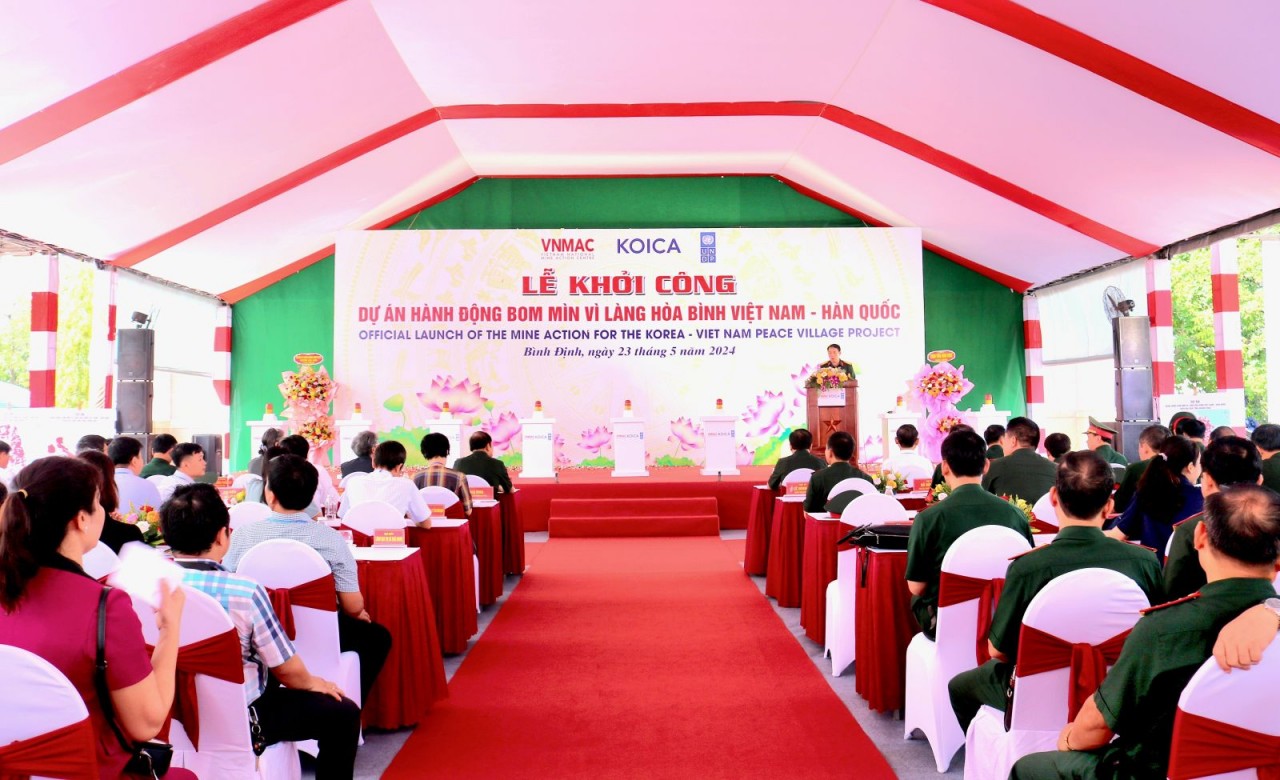The Republic of Korea (RoK) and Vietnam have embarked on a new phase of their partnership with the launch of the RoK-Vietnam Peace Village Project in the central provinces of Thua Thien-Hue, Quang Ngai, and Binh Dinh. This initiative, an extension of the successful Korea-Vietnam Mine Action Project (KVMAP), will address the lingering legacy of explosives from the war, fostering safer and more prosperous communities.
The Vietnam National Mine Action Centre (VNMAC), the Korea International Cooperation Agency (KOICA), and the UN Development Programme are joining forces in this endeavor, which is slated to conclude in December 2026. With a total investment of over USD 14 million in non-refundable aid from the RoK Government, the project signifies a strong commitment to Vietnam’s socio-economic development and the well-being of its people.
 |
| The launch of the RoK-Vietnam Peace Village Project. Photo: VNMAC |
Building on the achievements of KVMAP, which concluded in 2021, the new project will continue to focus on critical areas such as survey and clearance, victim assistance, explosive ordnance (EO) risk education, information management, and capacity building. During KVMAP, approximately 17,000 hectares were surveyed, and 10,000 hectares were cleared of explosives. Additionally, 450,000 people in Quang Binh and Binh Dinh provinces received risk education, and over 1,000 EO survivors benefited from health screenings and prosthetic devices or surgical operations.
The RoK-Vietnam Peace Village Project has a comprehensive scope. It aims to address the impact of bombs, mines, and unexploded ordnance (UXO) left behind from the war, protecting civilians and promoting local socio-economic development. The project will involve technical surveys of 15,000 hectares of land and the clearance of approximately 6,000 hectares of UXO-contaminated areas across the three provinces.
Furthermore, the project will provide vital support to UXO victims and persons with disabilities in the covered localities. It will also enhance the capacity of officials working in this field and contribute to the development of mechanisms, policies, and social solutions to assist UXO victims and the disabled.
Binh Dinh Province, in particular, faces significant challenges due to post-war pollution. According to Nguyen Tu Cong Hoang, Vice Chairman of the People’s Committee of Binh Dinh, approximately 250,000 hectares, or 40% of the province’s natural area, are contaminated with bombs, mines, and UXO. The previous cooperation project between Vietnam and the RoK from 2018 to 2021 made significant strides, clearing over 4,200 hectares of UXO-contaminated land and deactivating 69,000 UXOs. However, as Hoang noted, more than 26,800 people in the province still require support due to the impact of UXO.
 |
|
The project’s main goals include survey and clearance of contaminated areas, enhancing the capacity of mine action operators, EO risk education, victim assistance, and building climate-resilient infrastructure in the three provinces. |
Lee Byung Hwa, KOICA Vietnam Country Director, emphasized the significance of the RoK-Vietnam Peace Village Project as KOICA’s largest initiative in the field of mine action. The project aims to create a “Peace Village” by integrating demining efforts with sustainable economic and social development. According to Lee Byung Hwa, mine action is not just about ensuring safety; it takes on a deeper meaning when the cleared land is harnessed for local community development.
Sen. Lieut. Gen. Hoang Xuan Chien, Deputy Minister of National Defence, underscored the project’s impact on the safety and well-being of people in the three provinces. Once completed, it will enable residents in areas contaminated with bombs, mines, and explosives to lead safer and more secure lives during their daily activities and production.
Additionally, the project includes three component projects implemented by the People’s Committees of the respective provinces. These initiatives will provide support for human and livelihood development in Hoa Binh (peace) villages, positively impacting the socio-economic landscape of the localities.
Deputy Minister Hoang Xuan Chien also emphasized the importance of effective coordination between VNMAC, KOICA, and UNDP, urging them to work with the highest sense of responsibility to ensure the project’s activities are carried out as scheduled and with the utmost safety.
Demonstrating their commitment to the well-being of the communities, on May 22, UNDP, KOICA, VNMAC, and the People’s Committee of Binh Dinh Province, united to hand over a climate-resilient commune health station to the people of Phuoc Thanh commune in Tuy Phuoc district, Binh Dinh Province. This is just one of the 50 health stations that the project aims to support across the three provinces, equipped with features like rooftop solar panels, telehealth function rooms, and vaccine transportation boxes to ensure uninterrupted critical health services during extreme weather events. Furthermore, 400 flood and storm-resilient houses will be constructed for locals, providing a sense of stability and safety in their daily lives.
PM: Vietnam maintaining support for virus-hit nations
Vietnam will continue supporting countries hit by the COVID-19 pandemic, maintain normal economic activities with them, and provide them with basic necessities, including food, as needed, Prime Minister Nguyen Xuan Phuc said when addressing the Special ASEAN Summit on COVID-19 held online on April 14.
Vietnam Assists Nations Struggling with Covid-19 Impact
Vietnam will continue supporting countries hit by the COVID-19 pandemic, maintain normal economic activities with them, and provide them with basic necessities, including food, as needed, Prime Minister Nguyen Xuan Phuc said when addressing the Special ASEAN Summit on COVID-19 held online on April 14.








